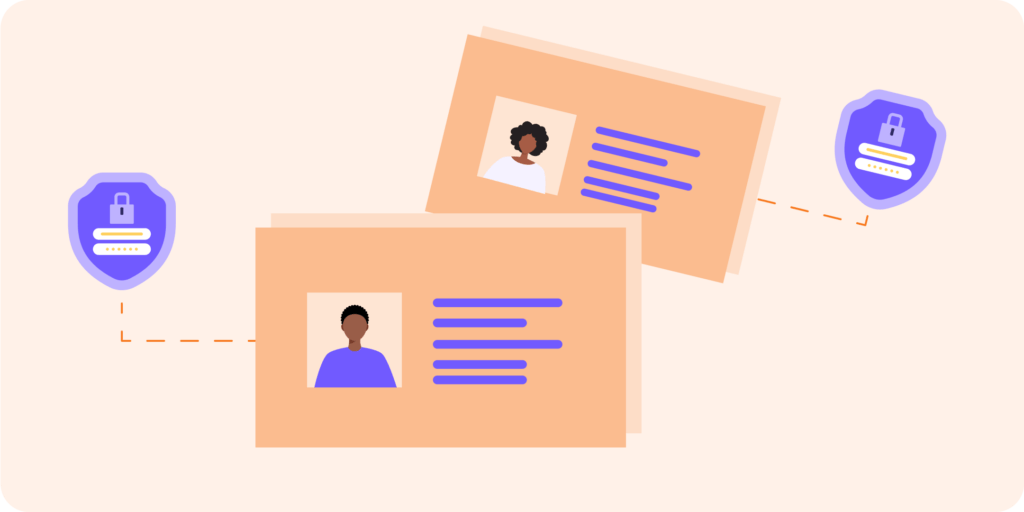Guarding Your Secret Recipe: How to Protect Your Personal Information Online

Welcome to our Givelify kitchen, where we’ll be cooking up a delightful analogy for something we all hold dear — our personal information. Just like a secret recipe passed down through generations, your Personally Identifiable Information (PII) adds a unique flavor to the dish of your identity.
In this blog, we’ll look at PII protection and discover why safeguarding it is as important as keeping your Great Grandma’s secret apple pie recipe out of the wrong hands.
The Secret Ingredients: What is PII?
Personally identifiable information, or PII, is like the special blend of ingredients that makes up your secret recipe. PII refers to any information that can be used to identify a specific individual.
These are key elements such as your name, address, phone number, and other personal details that, when combined, create the unique flavor of “you.”
Other items include your date of birth, social security number, and biometric data. Also included in this mix is information like your medical history, insurance information, and bank account numbers.
Why It’s Important to Protect Your Secret Recipe
It’s crucial to keep your secret recipe (PII) safe. PII often includes sensitive personal information that is confidential, and securing it helps protect an individual’s privacy. Unauthorized access can lead to identity theft, fraud, or other crimes.
With the prevalence of online interactions, protecting digital PII (such as usernames, passwords, and online profiles) is critical to preventing unauthorized access to accounts and potential cybercrimes.
What Happens When Your Secret Recipe Falls Into the Wrong Hands
Imagine your Great Grandma’s secret recipe that you’ve locked away in a hidden cabinet is stolen. This recipe creates the most flavorful and delightful apple pie that anyone has ever tasted. The pies are legendary and always a hit at the church bake sales. Everyone knows your Great Grandma’s apple pie when they take a bite — it’s unforgettable.
But one day, your mischievous cousin tips-toes into your kitchen and copies the steps and ingredients without you knowing. Fast forward a few months into the future and at the next family gathering, they surprise everyone with their apple pie. Their goal wasn’t to sell the recipe to a large corporate entity but to become the talk of the family while becoming a baking sensation.
Meanwhile, you’re left wondering how they did it. How did they perfectly recreate your Great Grandma’s secret apple pie recipe? It looked and tasted just like hers.
Similar to how your cousin was able to perfectly replicate your Great Grandma’s apple pie — having stolen the recipe — so can a cybercriminal replicate your identity if they get ahold of your PII. In the wrong hands, your personal information can be used by cybercriminals to pretend to be you.
A Scenario: How Cybercriminals Might Use Your Personal Information
One way cybercriminals may use your personally identifiable information (PII) is by exploiting the “reset password” feature to gain access to your online accounts.
When this happens, they’ll attempt to reset your password by using your publicly available personal information, such as your date of birth or zip code, to answer the security questions and gain access to your account.
This scenario highlights the importance of using strong, unique passwords and being cautious about the personal information you share online. Fortunately, there are a few simple steps you can take to ensure this doesn’t happen to you.
12 Tips to Protect Your Personally Identifiable Information (PII)
Protecting your personally identifiable information involves multiple approaches. Here are a few simple steps you can follow to safeguard your personal information and keep it from falling into the wrong hands:
- Create strong passwords for each of your online accounts. Incorporate a mix of uppercase and lowercase letters, numbers, and special characters with a length greater than eight characters. The longer the password, the stronger it is in preventing unwanted access.
- Utilize Two-Factor Authentication (2FA) when possible. Add an extra layer of security by enabling two-factor authentication. This usually involves an extra step to verify your identity before gaining access to your account.
- Regularly perform software updates. This includes software updates to your operating systems and antivirus tools to ensure you have the latest security patches.
- Be extremely cautious with emails. Avoid clicking on links or downloading attachments from unknown sources. Be wary even of those you’re familiar with since they too can be compromised. Phishing is a practice used by cybercriminals in which they pretend to be a company or person you trust to trick you into sharing your personal and sensitive information.
- Secure your Wi-Fi network at home. Implement a strong password and avoid using public Wi-Fi for sensitive transactions.
- Encrypt sensitive data. Enable encryption on devices like smartphones and computers and in the cloud.
- Be mindful of the information you share online. Adjust privacy settings on social media platforms to ensure only those you know and trust can see your profile.
- Monitor financial statements. Regularly review your financial accounts and promptly report any unauthorized transactions.
- Shred important documents. Before disposing of important documents, especially those that include personal information, shred them to safeguard against physical breaches.
- Secure your physical devices. Enable passcodes or biometric authentication on your devices to add another layer of protection and prevent unwanted access.
- Check your credit reports. Routinely review your credit report for inaccuracies or signs of identity theft.
- Stay informed. Use sources you trust to stay informed about the latest common cyber threats.
Just like a well-guarded secret recipe passed down through generations, your PII deserves the utmost protection. By understanding your personal information as a unique blend of ingredients, you can take the necessary steps to ensure your identity remains a special and secret recipe, shared only with those you trust.



